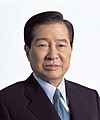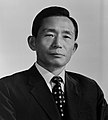 |
환영합니다! / Welcome To The South Korea Portal!  South Korea, officially the Republic of Korea (ROK), is a country in East Asia. It constitutes the southern half of the Korean Peninsula and borders North Korea along the Korean Demilitarized Zone, with the Yellow Sea to the west and the Sea of Japan to the east. Like North Korea, South Korea claims to be the sole legitimate government of the entire peninsula and adjacent islands. It has a population of 51.71 million, of which half live in the Seoul Metropolitan Area, the ninth most populous metropolitan area in the world; other major cities include Busan, Daegu, and Incheon. The Korean Peninsula was inhabited as early as the Lower Paleolithic period. Its first kingdom was noted in Chinese records in the early seventh century BCE. From the mid first century BCE, various polities consolidated into the rival kingdoms of Goguryeo, Baekje, and Silla, with the lattermost unifying the peninsula for the first time in the late seventh century CE. The Goryeo dynasty (918–1392) achieved lasting unification and established the basis for modern Korean identity. The subsequent Joseon dynasty (1392–1897) saw the height of cultural, economic, and scientific achievement as well as prolonged peace and isolationism from the mid 17th century. The succeeding Korean Empire (1897–1910) sought modernization and reform by was annexed in 1910 into the Empire of Japan. Japanese rule ended following Japan's surrender in World War II, after which Korea was divided into two zones: a northern zone, which was occupied by the Soviet Union, and a southern zone, which was occupied by the United States. After negotiations on reunification failed, the southern zone became the Republic of Korea in August 1948, while the northern zone became the communist Democratic People's Republic of Korea the following month. In 1950, a North Korean invasion triggered the Korean War, one of the first major proxy conflicts of the Cold War, which saw extensive fighting involving the American-led United Nations Command and the Soviet-backed People's Volunteer Army from China. The war ended in 1953 with an armistice but no peace treaty, leading to the ongoing Korean conflict, and left three million Koreans dead and the economy in ruins. South Korea endured a series of dictatorships punctuated by coups, revolutions, and violent uprisings, but also experienced a soaring economy and one of the fastest rises in average GDP per capita, leading to its emergence as one of the Four Asian Tigers. The June Democratic Struggle of 1987 ended authoritarian rule and led to the establishment of the current Sixth Republic. (Full article...) Selected article -The 1988 Summer Olympics (Korean: 1988년 하계 올림픽; RR: 1988-nyeon Hagye Ollimpik), officially the Games of the XXIV Olympiad (제24회 올림픽경기대회; Je-24-hoe Ollimpik-Gyeonggidaehoe) and officially branded as Seoul 1988 (서울 1988), were an international multi-sport event held from 17 September to 2 October 1988 in Seoul, South Korea. 159 nations were represented at the games by a total of 8,391 athletes (6,197 men and 2,194 women). 237 events were held and 27,221 volunteers helped to prepare the Olympics. The 1988 Seoul Olympics were the second summer Olympic Games held in Asia, after Tokyo 1964, and the first held in South Korea. As the host country, South Korea ranked fourth overall, winning 12 gold medals and 33 medals in the competition. 11,331 media (4,978 written press and 6,353 broadcasters) showed the Games all over the world. These were the last Olympic Games of the Cold War, as well as for the Soviet Union and East Germany, as both ceased to exist before the next Olympic Games in 1992. The Soviet Union dominated the medal count, winning 55 gold and 132 total medals. The results that got closest to that medal haul in the years since are China's and the United States's 48 gold medals in 2008 and 2012, respectively, and the United States's 126 total medals in 2024. Compared to the 1980 Summer Olympics (Moscow) and the 1984 Summer Olympics (Los Angeles), which were divided into two camps by ideology, the 1988 Seoul Olympics was a competition in which the boycotts virtually disappeared, although they were not completely over. North Korea boycotted the 1988 Seoul Olympics, as did five socialist countries including Cuba, an ally of North Korea. Albania, Ethiopia, and Seychelles did not respond to the invitation sent by the IOC. Nicaragua did not participate due to athletic and financial considerations, while the expected participation of Madagascar was withdrawn for financial reasons. Nonetheless, the much larger boycotts seen in the three previous editions were avoided, resulting in the largest number of participating nations during the Cold War era. (Full article...) Selected image The 2010 G-20 Seoul summit was the fifth meeting of the G-20 heads of government to discuss the global financial system and the world economy. It was held in Seoul, South Korea. More did you know -
In the news
This is a Good article, an article that meets a core set of high editorial standards.
Kim Ki-young (Korean: 김기영; October 10, 1919 – February 5, 1998) was a South Korean film director, known for his intensely psychosexual and melodramatic horror films, often focusing on the psychology of their female characters. Kim was born in Seoul during the colonial period, raised in Pyongyang, where he became interested in theater and cinema. In Korea after the end of World War II, he studied dentistry while becoming involved in the theater. During the Korean War, he made propaganda films for the United States Information Service. In 1955, he used discarded movie equipments to produce his first two films. With the success of these two films Kim formed his own production company and produced popular melodramas for the rest of the decade. Kim Ki-young's first expression of his mature style was in The Housemaid (1960), which featured a powerful femme fatale character. It is widely considered one of the best Korean films of all time. After a "Golden Age" during the 1960s, the 1970s were a low-point in the history of Korean cinema because of government censorship and a decrease in audience attendance. Nevertheless, working independently, Kim produced some of his most eccentric cinematic creations in this era. Films such as Insect Woman (1972) and Iodo (1977) were successful at the time and highly influential on the younger generations of South Korean filmmakers both at their time of release, and with their rediscovery years later. By the 1980s, Kim's popularity had declined, and his output decreased in the second half of the decade. Neglected by the mainstream during much of the 1990s, Kim became a cult figure in South Korean film Internet forums in the early 1990s. Widespread international interest in his work was stimulated by a career retrospective at the 1997 Pusan International Film Festival. He was preparing a comeback film when he and his wife were killed in a house fire in 1998. The Berlin International Film Festival gave Kim a posthumous retrospective in 1998, and the French Cinémathèque screened 18 of Kim's films, some newly rediscovered and restored, in 2006. Through the efforts of the Korean Film Council (KOFIC), previously lost films by Kim Ki-young continue to be rediscovered and restored. Many current prominent South Korean filmmakers, including directors Im Sang-soo, Bong Joon-ho and Park Chan-wook, claim Kim Ki-young as an influence on their careers. (Full article...) General images -The following are images from various South Korea-related articles on Wikipedia.
Did you know (auto-generated)
WikiProjectsSee WikiProject Korea for collaborating on South Korea topics, and more broadly, on all things Korea-related. South Korea topics
CategoriesAdministrative divisions of South Korea
Related portalsEast Asia Associated WikimediaThe following Wikimedia Foundation sister projects provide more on this subject:
Web resources
SourcesDiscover Wikipedia using portals
|
































































You must be logged in to post a comment.